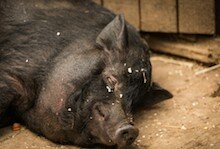A different kind of sexuality
What is it about Esther Raab’s poetry that reaches inside me and disturbs me so deeply? How can I explain the fact that a poet who was born more than 100 years ago – and has been dead for more than 30 – is for me far more innovative and daring than most women poets alive today?
By guiding you through several of her poems, I’ll show you how Raab breaks through normative definitions such as the so-called “feminine woman” or “masculine woman” or “incomplete woman” (incomplete because lacking a phallus, the male sex organ). Raab is none of these and she brings a completely different type of erotica to Hebrew poetry.
What is an “incomplete woman”? In patriarchal Freudian psychoanalytic thinking, the phallus is of chief importance, and women are seen as inferior men, a type of man but without a phallus. Women are said to be jealous about this loss, and to feel incomplete.
One of Raab’s best known poems is ‘I’m beneath the bramble’, which is also the first poem she chose to show to Asher Barash and Ya’akov Rabinovich, editors of the literary journal Echoes, during a walk with them in her home town of Petah Tikva.
I’m beneath the bramble,
easy, wanton,
I raised its thorns
towards you laughing,
light beats upon the expanse,
each fold in my dress
whispers to me:
“White and quaking
you go out
towards death.”
You appear –
and lightly I exult
brandishing a glittering sword –
and at high noon
in fields white with light
I issued our sentence
as one!
1922 (Translated by Harold Schimmel)
This is an erotic rather than a romantic sex scene, which does not take place at sunset, the hour of romantic love, but rather at high noon, when the light hits the expanse of fields and turns them a (blinding) white.
Raab’s lines are dreamlike; they confound our senses and so demand our complete attention. The poet is located under a bramble. Take note: it is not fragrant jasmine, not soft grass, and not a looming cedar or eucalyptus tree, but a bramble – a thorny, piercing shrub. The speaker calls herself “easy, wanton”, and her language is surprising: “I raised its thorns/ toward you . . .” That is, I, the woman, raise the bramble thorns towards you, the man. What can this aggressive action possibly mean? In our imagination we see a porcupine raise its quills, or a prickly pear its spines. While wantonness may be traditionally associated with women, the erection evoked by the word “raise” is obviously masculine. In Hebrew, the words for these movements are nearly the same and are composed of the same letters in different order: zahkeef means to raise something, to cause it to stand erect, and zikpah is an erection.
This woman is in no way incomplete. She completes herself, and might even be called a phallic woman. Though wearing a dress, she bears masculine characteristics: she is active, she raises the (phallic) thorns in the direction of the man, she wields a (phallic) sword, and issues death sentences to lovers and to love itself. One imagines an erotic scene in the illuminated, abandoned field: the thorns are erect, the woman’s dress is wrinkled, she herself is white (perhaps her naked body, after the dress is removed?). The woman is dancing, [the literal meaning of the word meholelet, translated here as “quaking”]; but the Hebrew word for dancing recalls one that sounds almost the same, mehulelet – a woman who has been violated.
Eros and thanatos, two joined but oppositional motifs, agitate together inside the poem. Why does the man represent death? Why can’t the woman find tranquillity in this love? Why does she hand down the sentence without an explanation for him or for herself? We may find an answer in other poems.
A short poem from the apparently innocent “Melodies of a Handmaiden” of 1926 seems intended to mislead. While the speaker is called a handmaiden (a servant), the word also denotes a sex slave. [Most Hebrew words are formed from three-consonant roots; the same word may have several meanings, and similar-sounding words often have different meanings – as in the case above of meholelet – mehulelet; the disparate meanings are nonetheless connected by their common roots. The word amah (aleph-mem-heh) has both positive and negative connotations: handmaiden or sex slave. In addition, it denotes the middle finger, and not unsurprisingly, the male sex organ. And, by association, it recalls the word for mother – eemah (aleph-mem-aleph). – Trans.]
In paraphrase the poem reads: “Night by night my desire will grow/ for your slim hard legs over me/ and you proud and foreign/ on my back will tread/ as in a harvested field/ the golden blessing – / your legs wallow”. How does the poem support the strength rather than weakness of the speaker? [. . .] She is a field, the earth, and so greater than the lover. She wants her lover to wallow in the golden field, that is, in her, and she maintains her pride, even when he does so. She has led the man to this, and is not servile though her role is that of handmaiden. The words “proud and foreign” – written about the man and spoken in her excitement over him– intensify the erotic effect, and describe the woman as well. We would expect someone trodden on like a field to groan under the burden, but that’s not what happens in this case. The speaker enjoys it in what seems a sado-masochistic way; she has asked for the violence she experiences. But the speaker is both sadist and masochist. The man, as in the earlier poem, is completely passive, almost imperceptible – we don’t know what he feels and thinks.
The formula of a strong woman and a weak man appears in many of Raab’s early poems:
Thus will you love me
and day after day rend your heart for me –
for I will never
be your beloved;
since only on heights-of-sorrow
do we rest
and we will not descend
to the baseness of couches in rooms;
for I lie in wait still
beneath the warm eucalyptus trees -
crazed with love.
1926 (Translated by Harold Schimmel)
If the poem were not so serious we might smile at the stereotype of people who take pride in wallowing in difficulties: “only on heights-of-sorrow / do we rest” – that is, there is no rest. (The Jewish mother in the joke says: “I’ll rest in the grave”.)
We see that earlier motifs return here: rebellion against the bourgeoisie (their couches and rooms and homes are “base”). The woman has strong drives and desires and will never belong at home but rather in nature. She prefers to make love in nature, like an animal, under the warm eucalyptus trees and on a rustling bed of leaves.
If we go back to the poem “I’m beneath the bramble”, perhaps we can now understand why the poet “issued our sentence / as one!” Perhaps out of distaste for the foundation of ordinary relationships in home and family life. Although, in Raab’s later work, many poems feature submissive women.
There are many faces to Raab’s work. In one untitled poem from her 1926 collection she is both forceful and tender. It begins with a pronouncement of her unsuitability as a homebody: “No hearth or stove/ for you I’ll nurture . . . ” With her “live green eyes” she goes on to express the desire to make love outdoors, in hot and heavy swamps, in a storm of lightning and sparks.
In the second stanza of this poem, the speaker reveals a softer, more conciliatory side, having built “a nest in her heart” for her lover, who sadly clings to her. Why is he sad? Perhaps because he knows he will never be able to live with her in a real nest, a home with a hearth, food cooking on the fire, whose scents fill the air.
The end of the poem integrates these two sides of the speaker. The woman sees that her lover’s head is heavy; she admits her harshness and ambivalence, and the man’s confusion: “Your heart will never know what it is courting.” All night she drags him after her “on my difficult path/ the cables of your bondage unsevered”.
In psychological terms, the poem may be viewed in the light of Jung’s theories about androgyny: woman’s anima found in all men, and the masculine animus found in all women. And now I’ll turn to a completely different kind of love.
In her 1932 ‘Limbs in darkness’ Raab depicts a sexual contact between powerful equals. She uses the phrase “brother to brother”. About brotherly love in this poem scholar Lily Ratok notes: “When a woman’s sexual attraction for a man, rather than her emotional dependence on him, is the basis of love, the relationship is stronger”. (Afterword to In a different voice, Kibbutz Hameuchad Press, 1994)
There is no doubt that the poem depicts a sex act. The scene takes place in darkness. Both partners leap towards each other with the force of erotic hauteur. A geed – Hebrew for tendon and a traditional euphemism for penis – connects the body parts in the title. At the end of the poem, four clipped lines depict an orgasm: “pulse throbs – / and ceases/ pulse throbs/ and then naught”.
Finally, let us consider ‘Towards you’, written in 1959. It may of course be interpreted as a nature poem on the intimate relations between the speaker and mother earth, or with her mother country, a safe interpretation given to many of Raab’s more daring poems. Some see it as a representation of the relations between mother and child. I would like to raise the possibility that it shows intimate relations between two women, one of whom is compared to mother earth.
The first four lines depict a gesture of love and a sexual encounter between two female entities: “And again you take me in/ and again I hide my face in your hem/ your secret is mine/ only you and I make a sound . . .” The (female) earth is furthermore said to have “curves of sky”. [Because Hebrew contains a high degree of grammatical gender, every noun, pronoun and verb in these lines is clearly marked as feminine. The poem also makes use of irregular masculine nouns, such as the Hebrew word for dream, which takes a feminine plural form, a sort of transgendered word, if you will. – Trans.]
Luce Irigaray, a French psychoanalyst and philosopher, has coined the political-rhetorical phrase “poetic cunt”. In essence, she claims that the entire body of a woman is an advanced sexual organ with many erotic zones. In a similar fashion Irigaray defines women’s writing as a mystical site with a multiplicity of meanings, incoherent, subjective, and always flowing.
‘Towards you’, like many other Raab poems, contains phallic images too: for example, “the line of your mountains” that “broke through and rose”. But here the masculine mountains belong to the feminine earth. In addition, one finds a phallic “long, piercing fate”. The apparently simple poem with its banal title nonetheless contains an erotic experience involving two female entities, their hidden phalli, blood, earth and ancient dreams.
One may dispute psychological theories. However, patriarchy and inequality are existential facts. Women have been suppressed for generations in family, culture, society and art, and continue to be today in every spot on the globe.
I once believed that everyone was equal before the law, and that everyone – men and women – had the same opportunities. Since I’ve grown up, I’ve taken a good look, experienced inequality, and I know that women still have a long way to go before they arrive at equal treatment in society, equal pay for equal work, and the disappearance of stereotypes.
In its representation of sexual issues of every kind about the characteristics considered feminine or masculine, Esther Raab’s poetry is an important contribution to feminist poetry; we could say that she raised her head against patriarchal hegemony.
This article first appeared in Hebrew in September 2005 on the web site Poetry Place. Dorit Weisman is the author of six books of poetry, a book of Hebrew translations of the work of Charles Bukowski (now in its fourth printing) and a journal of breast cancer – Positive Result, Jerusalem, Carmel Publishers, 2010.








